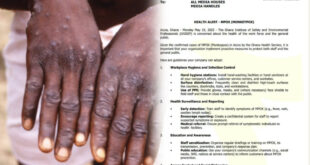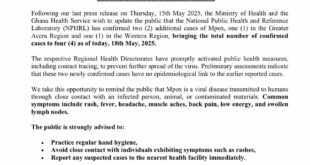The Chief Executive Officer for Peace And Love Hospital Breast care International and former chair of the Ghana Cancer Board, Dr Beatrice Wiafe Addai, has revealed that over 2000 women died from breast cancer in 2020.
Speaking to the Asaase radio , Dr Addai said the deaths were partly caused by a halt in medical services for some patients in the lock down.
“According to Globocan (New Global Cancer Data 2020), if in 2019 in Ghana, for example, we lost about thousand and eight hundred women to breast cancer, in 2020, we lost over 2,000. So the number of people dying from breast cancer has increased,” she said.
She explained that the impact of COVID-19, particularly during the lockdown, affected most medical treatment for cancer patients.
“There was a lot of disruption in treatment. All surgeries were suspended. So people with breast cancer at the early stage who needed the lumpectomy or breast conserving surgery, could not have their surgeries,” Dr Addai said.
According to statistics from the New Global Cancer, female breast cancer has become the most commonly diagnosed cancer, surpassing lung cancer, in particular due to high prevalence in low- and middle-income countries (LMICs).
Lung cancer remains the leading cause of cancer deaths, not only in many LMICs but also in higher-income regions such as North America, Europe and Australia.
Awareness creation
Dr Addai, who doubles as a breast surgeon, urged the government to do more to support the treatment of breast cancer.
“In Ghana, we don’t have any support system when it comes to breast cancer. The government can partner civil society organisations working to create awareness on breast cancer. The Ghana Health Service can also retrain some of their nurses in the CHPs compound to also embark on the awareness creation exercise,” she said.
BREAST CANCER CAUSES MORE HARM THAN GOOD LET’S ALL TREND CAUTIOUS AS OCTOBER MARKS BREAST CANCER AWARENESS MONTH
Every October is Breast Cancer Awareness Month, which is marked in countries across the world, and helps to increase attention and support for awareness, early diagnosis, and treatment as well as palliative care for women facing this disease.
There are about 1.7 million new cases and 522 000 deaths from breast cancer each year.
Breast cancer is the most common cancer in women worldwide, and is the most common cause of cancer among women in most countries. In low- and middle-income countries the incidence has been rising steadily due to increased life expectancy, changing reproductive patterns (such as later age at first childbirth and less breast-feeding), and the adoption of western lifestyles.
Early diagnosis remains the cornerstone of breast cancer control. When found early, and if adequate diagnosis and treatment are available, there is a good chance that breast cancer can be cured. If detected late, however, curative treatment is often no longer an option. In such cases, treatment may improve quality of life and delay disease progression, while supportive and palliative care should be readily available to relieve suffering for patients and their families.
The majority of women who die from breast cancer (324 000) live in low- and middle-income countries, where most women are diagnosed in late stages due to a variety of factors. These include limited awareness on the part of the public and health care providers, and the lack of access to timely, affordable and effective diagnosis and treatment.
WHO promotes comprehensive breast cancer control programmes as part of national cancer control plans. The recommended early detection strategies for low- and middle-income countries are to increase awareness of early signs and symptoms among health care providers and the public, and to increase capacity for prompt diagnostic evaluation (including imaging, biopsy, and pathology services).
Breast screening with mammography screening is very costly and is feasible only in countries with good health infrastructure that can afford a long-term programme. The value of clinical breast examination is an important area of research, particularly in lower resource settings. [WHO position paper 2014].
In November, WHO will release a new document to help countries improve capacity for early diagnosis for breast and other cancers.
LET’S ALL HELP FIGHT BREAST CANCER
BY: YESU SUANI KWABENA MATHEW.

Congratulations
#MyGhanaMediaNetwork@1year
Source: MyGhanaMedia.com


Send your news stories to myghanamedia@gmail.com and Chat with us via WhatsApp on +233 200818719
 MYGHANAMEDIA.COM Best Source Of Latest News
MYGHANAMEDIA.COM Best Source Of Latest News




